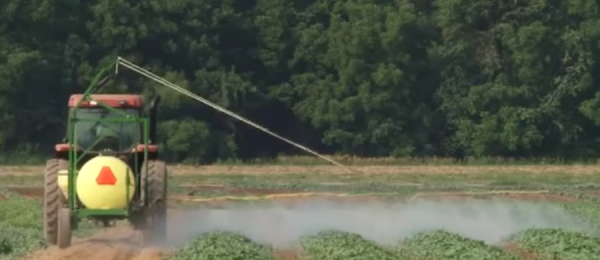By Vishal Goel, | March 14, 2017

Chronic exposure to pesticides has been linked to Alzheimer’s and Parkinson’s diseases, cancer, hormone disruption, developmental disorders and sterility. (YouTube)
According to a UN report, an estimated 200,000 people globally die from the toxic exposure of pesticides every year. The report said that food production by excessive use of pesticides comes at the expense of human health and environment. The report also listed the 1984 Bhopal gas tragedy as "one of the most catastrophic incidents involving pesticides."
Like Us on Facebook
Two UN human rights experts are calling for a comprehensive new global treaty to carry out the regulation and phasing out of the use of dangerous pesticides in farming so as to move towards sustainable agricultural practices.
Hilal Elver, the Special Rapporteur on the right to food and Baskut Tuncak, the Special Rapporteur on Toxics, said in a joint statement to the Human Rights Council in Geneva that excessive use of pesticides is very dangerous to human health and the environment. He further added that it is misleading to claim that pesticides are vital to ensuring food security. The Special Rapporteurs pointed to research showing that pesticides have been responsible for an estimated 200,000 acute poisoning deaths each year, 90 percent of which occurred in developing countries where health, safety, and environmental regulations are weaker.
Chronic exposure to pesticides has been linked to Alzheimer's and Parkinson's diseases, cancer, hormone disruption, developmental disorders, and sterility. Communities living near plantations, indigenous communities, farmers, agricultural workers, pregnant women, and children are particularly vulnerable to pesticide exposure and thus require special protection.
The experts particularly emphasized the obligation of nations to protect the children from hazardous pesticides, while also warning that certain pesticides can persist in the environment for decades posing a grave threat to the entire ecological system on which the food production depends. While certain international treaties currently offer protection from the use of a few pesticides, the experts stressed that a global treaty to regulate the vast majority of them throughout their life cycle does not exist, leaving a critical gap in the human rights protection framework.
-
Use of Coronavirus Pandemic Drones Raises Privacy Concerns: Drones Spread Fear, Local Officials Say

-
Coronavirus Hampers The Delivery Of Lockheed Martin F-35 Stealth Fighters For 2020

-
Instagram Speeds Up Plans to Add Account Memorialization Feature Due to COVID-19 Deaths

-
NASA: Perseverance Plans to Bring 'Mars Rock' to Earth in 2031

-
600 Dead And 3,000 In The Hospital as Iranians Believed Drinking High-Concentrations of Alcohol Can Cure The Coronavirus

-
600 Dead And 3,000 In The Hospital as Iranians Believed Drinking High-Concentrations of Alcohol Can Cure The Coronavirus

-
COVID-19: Doctors, Nurses Use Virtual Reality to Learn New Skills in Treating Coronavirus Patients










